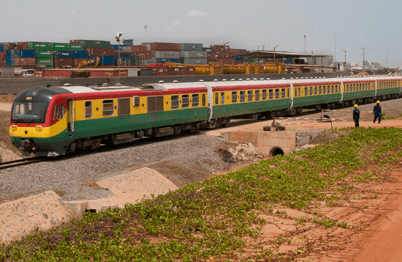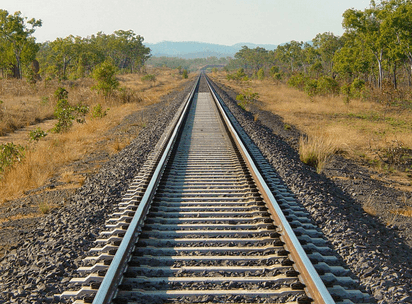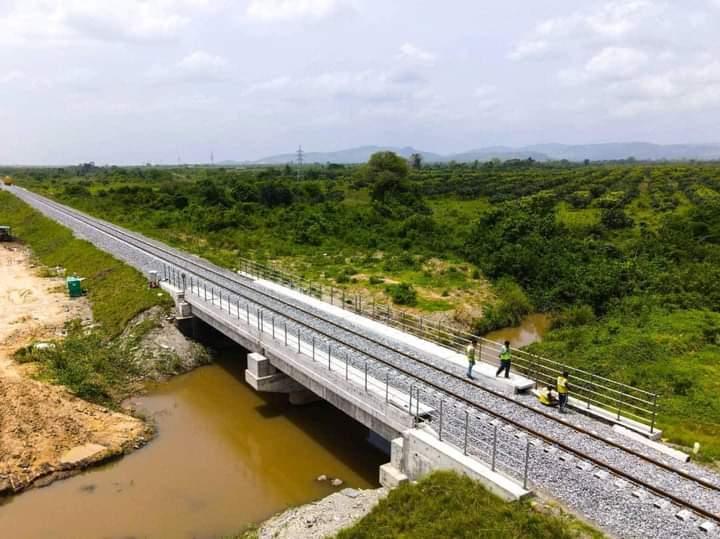How much money has been sunk into Ghana’s phantom, opaque and underdeveloped railways sector?
 Ghana’s railway sector has a long and winding story with no obvious ending in sight. From its glorious days before Ghana became independent to this day, it’s been a bumpy story often told in grand style with six figures at glitzy signing ceremonies.
Ghana’s railway sector has a long and winding story with no obvious ending in sight. From its glorious days before Ghana became independent to this day, it’s been a bumpy story often told in grand style with six figures at glitzy signing ceremonies.
The railway sector in Ghana is however, the most underdeveloped of the country’s transport sector, even though it also appears to be the sector with some very high value investments over time, it seems to be showing very little result.
Every government makes noise about revamping the sector, and then comes up with all kinds of deals but the railway sector in Ghana can be said to be practically non-existent, despite the setting up of a Ministry of Railways. Railway travel hardly counts when Ghanaians make travel plans. What remains of the railway system is a pale shadow of the very first system that the British introduced in the country.
The British colonial government constructed the first railway lines in Ghana more than 100 years ago in 1898. The lines linked the coastal town of Sekondi to Obuasi and Tarkwa, two of the country’s major gold producing towns.
By the mid-1920s rail lines covered large areas of the country and some 80 per cent of cocoa exports were transported by rail during the period, as Ghana became the leading exporter of cocoa in the world.
But over the years, while rail transport became one of the main means of transport in Britain and other developed countries, the railways system in Ghana suffered neglect and became dysfunctional.
Currently, there are questions about how the artist Ibrahim Mahama obtained a large amount of the archival materials of the Ghana Railways Corporation. Mahama has been exhibiting the items around the world. It’s not clear if the Corporation or the country gets any of the potential financial benefits from the exhibitions.
The $21 billion plan
There have been countless talks about reviving the railway sector over time.
In 2019, The Ministry of Railways talked about a $21 billion plan to expand and modernise the network.
An article on the Ministry’s website contains the following words: “Today, the sector is on its knees. Neglected by post-independence governments in favour of road travel and other facilities as the West African country developed to become a regional success story, it is estimated that less than 13 per cent of Ghana’s original networks are operational.
But that could be set to change as Nana Akufo-Addo becomes the latest president to champion the redevelopment of the country’s railways.”
Despite these promises, the railway sector is filled with more promises and agreements of projects valued in billions of dollars than actual rail lines.
What happened to the $30b light rail project?
 In 2015, the Ghana government announced it was developing a proposal to seek $12 billion to $30 billion for a light rail line in Accra and an inter-city link in Kumasi.
In 2015, the Ghana government announced it was developing a proposal to seek $12 billion to $30 billion for a light rail line in Accra and an inter-city link in Kumasi.
The Railway Gazette citing a New York investment bank, Chesterfield Faring said the Minister responsible for Public-Private Partnerships (PPP) at that time, Rashid Pelpuo had appointed it to devise a request for proposals for PPP contracts for the projects.
While there was no clarity on when the appointment was made and whether a contract was signed, the report said phase one is provisionally estimated at $12 billion, with the total investment growing to $30 billion over a decade.
The government then had hoped to attract financing from South Korea, Japan and elsewhere, the report said. It’s been eight years now since this project was mentioned, but there is no information about it in the public domain.
The $2.2b GERC and $1b Chinese agreements
In April 2019, the Ministry of Railways Development announced that it had reached a Concession Agreement with the Ghana European Railway Consortium (GERC) to construct the Eastern Railway line project at the cost of $2.2 billion. The 340 kilometre-project was to run from the Tema Port through Accra, Koforidua and end in Kumasi. The Ghana government said it had a 30 per cent share in the Build, Operate and Transfer (BOT) project.
One time Minister of Railways Development, Joe Ghartey, announced in May 2019 that the Ghana government has signed two separate contract agreements with the Chinese government to secure a $1 billion facility to revamp the country’s railways sector.
He said the two agreements of $500 million each, were signed in China as a follow-up plan by Ghana to restore and improve rail transportation.
Not long after, Mr Ghartey updating the public on the status of railway infrastructural development and rehabilitation works ongoing in the country, told the media that the government has approved $230 million for the purchase of 30 rolling stock coaches for rail transport in the country and some are expected to arrive by September 2019.
He also said the Akufo-Addo-led government was determined to construct standard gauge rail network using asphalt as the basis for foundation and capable to run 160 kilometres per hour. It would be great to see how far this innovative project has gone.
Mr Ghartey added that between 1956 and 2017, the country’s rail network stood at 947 kilometres, and that’s why the government was focused on increasing the rail network and leverage on railway development as a key enabler for socio-economic development.
The $560m Amandi agreement
In June 2020, the Ghana government signed a $560 million agreement with Amandi Holdings Limited for the construction of sections of the Western Railway Line (Standard Gauge Line) between Takoradi Harbour and the Huni Valley.
The signing ceremony was done in Accra in the presence of Mr Joe Ghartey, the Minister of Railway Development; Mr Richard Diegong Dombo, the Chief Executive Officer of the Ghana Railway Development Authority (GRDA) and Mr Nadav Simhoni, Managing Director, Amandi Holdings Ltd signed for his company.
The Deutsche Bank €598m railway agreement
Not long after, Parliament approved another total of €598.7 million loan agreement between the government and the Deutsche Bank to finance the construction of sections of the Western railway lines.
The agreement was expected to cover the proposed construction of the Standard Gauge from Takoradi Port to Huni Valley.
The loan comprised a facility agreement of €523,000,000 and a commercial loan of €75,657,500 between Ghana and the Deutsche Bank.
Government says it has invested $2 billion in railways
In October 2020, the President Nana Addo Dankwa Akufo-Addo was in the news talking about the massive investment made in the railway sector by his Administration.
He said more than 200 kilometres of standard gauge railway lines had been constructed over three years across the country.
And the Ministry of Railways Development, stated at that time that close to about $2 billion was being invested by the government to upgrade railway lines in the country.
The move, it was reported, tied in with the Ghana Industrialization Project, under which many infrastructural facilities were lined up for execution to bring prosperity to the people.
The Ghana-Burkina Faso rail connectivity
There was also talk about a Ghana-Burkina Faso rail connectivity. According to the Burkina Faso Minister of Transport, Urban Mobility and Road Safety, Mr Vincent Dabilgou, the project which started as a concept, had progressed significantly with both countries finalising and adopting Terms of Reference for the implementation of the railway interconnectivity project.
A Ministry of Railways Development statement said the two countries had agreed on the proposed route for the rail link which starts from Ouagadougou through Kombissiri, Manga, Béguédo, Garango, Tenkodog, Bagré-Pole, Zabré, Pô and ends at Dakola-Paga border link, a total distance of approximately 320 km.
Ghana spends $5 million on one kilometre of railway line
While the talks about investments have been going on, news broke that the railway sector is bedeviled with massive theft.
Ministry of Railway Development was compelled to call for public support in the fight to curb the persistent stealing of railway lines.

Mr. Kwaku Asante-Boateng, the Deputy Minister was cited as saying the country had lost substantial quantities of railway lines over the years through such thefts, lamenting that the situation could devastate the sector if not halted. The Ministry also estimated that it costs the country about $5 million to construct one kilometre stretch of railway line.
In December 2021, Mr John-Peter Amewu, the then Minister of Railways Development, announced that government has paid €68 million to Amandi Holdings Limited to begin construction works on the Manso-Huni Valley rail line in the Western Region.
He later said the government was soon to begin the construction of a new railway line from Accra to Nsawam.
He said the old Accra-Nsawam line, a narrow gauge, would be developed into a standard gauge to make it more robust, firm, and safe for transportation.
The $3.2b project by South African company Thelo DB Consortium
While at it, a South African company, Thelo DB Consortium announced the signing of a $3.2 billion agreement for the Western Railway Line Project with the Ghana government on July 25, 2022. The agreement is for 25 years.
According to the Ministry of Railways Development, the country’s Western Railway line is a total of 339km from the Takoradi Harbour to Kumasi but only 66km is operational.
Ronnie Ntuli, Chairman of Thelo DB, was quoted as saying: “The Western Railway Line Project will transform Ghana’s existing railway infrastructure base into a modern, robust and integrated railway system, with the associated infrastructure to position Ghana’s rail network as a leading transport system in Africa.”
The company said in a statement that the project includes planning (all project preparation-related activities, such as feasibility studies, demand analysis, preliminary and detailed design, and procurement consulting); implementation (systems engineering design, construction supervision, design review, audit systems engineering, testing and commissioning of rolling stock and infrastructure); and operations and maintenance management (early train operator, consulting services in terms of infrastructure operations, rolling stock operations, infrastructure and rolling stock maintenance)
Completion of the Tema-Mpakadan railway line
John Amewu in April 2021, announced that about 80 per cent of the 97km Tema-Mpakadan railway line had been completed.
He noted further that the project would be completed sooner than expected and that the rail bridge across the Volta River at Senchi in the Eastern Region would be completed by the end of August that year. The completion of that project would add some value to rail transport.
Mr Amewu in January 2022 announced that the government will soon begin the construction of a new railway line from Accra to Nsawam.
He said the old Accra-Nsawam line, a narrow gauge, would be developed into a standard gauge to make it more robust, firm, and safe for transportation.
Afreximbank provides $1 million for rail development feasibility studies
In June this year, the African Export-Import Bank (Afreximbank) held its 30th Anniversary Annual Meetings in Accra. At the Meetings, the Bank provided $1 million to Ghana for a feasibility study for railway development in the country.
According to reports, the feasibility study is to bring on stream an estimated asset of $3.5 billion for railway rehabilitation and development to support economic activities, including the facilitation of the movement of people and goods.
The Bank indicated that the $1 million would be provided to the Ghana Railway Company Limited as a project preparation facility for the Western corridor railway line.
The $2.6 billion sky train deal from South Africa
In 2019 the Ghana government signed an agreement with a South African group, known as Africa Investment (Ai) SkyTrain Consortium, for the construction of the Accra Sky Train Project.
According to news reports, Mr Joe Ghartey, signed the agreement for Ghana on the sidelines of the Africa Investment Forum in Johannesburg, South Africa.
 He emphasised that the Sky Train Project was the solution to the ever-increasing road traffic congestion in Accra, with its detrimental effects on economic activity, pollution and the quality of life, the reports said.
He emphasised that the Sky Train Project was the solution to the ever-increasing road traffic congestion in Accra, with its detrimental effects on economic activity, pollution and the quality of life, the reports said.
He was quoted by the reports to have said, “There is confidence in the project. The promoters (Ai SkyTrain Consortium) are very serious, and that is why we invited the President, himself, to witness the signing. This should assure the investors that government is solidly behind it. The economics of this project are also good. We are very excited about the prospects.”
President Akufo-Addo was cited to have said that the agreement marked a critical step in Ghana’s efforts of meeting important infrastructural needs, saying, “This is a happy day for Ghana and its people”.
To be built above the ground, the train tracks were to be 194km long and transport nearly 400,000 passengers a year within the Greater Accra area, covering five routes. Skytrain, the project’s trademarked brand name, was to create 5,000 jobs throughout the construction period, it was reported.
But two years later in 2021, Peter Amewu said the project is too expensive for the country.
“I don’t see a sky train being done in the next 3 to 4 years let’s be very frank to ourselves,” Amewu said on Citi TV.
“A kilometre of a railway line is about four to five times the cost of building concrete infrastructure in terms of building an asphaltic road,” Amewu said.
So effectively, the sky train won’t be built.
Minority demands refund of $2 million paid in Sky Train Project
On Monday July 17, 2023 the Minority National Democratic Congress (NDC) MPs criticised the government for the payment of $2 million to Africa Investor Holdings Limited, a firm in Mauritius for the Accra Sky Train Project without the necessary parliamentary approval.
Mr Kwame Governs Agbodza, the Minority Chief Whip and Member of Parliament (MP) for Adaklu, told the press in Parliament House in Accra that the payment of the money did not also follow the requisite Cabinet approval as well as public procurement approval.
The Minority therefore, appealed to the government to ensure that the $2 million was refunded to the State.
Mr Ghartey, a former Minister of Railways Development who is one of the contestants seeking to become the flag bearer of the New Patriotic Party for the 2024 general elections, has however reacted to the demand saying he did not approve nor made any payment of $2 million to the Mauritius company on the botched Accra Sky Train project.
Conclusion
Considering the number of projects in the country’s railway sector, and the different values of financing mentioned for each phase, it’s curious why the country’s railway sector isn’t showing any significant improvement.
Is there any possibility, that the sector is being used as a cash cow by corrupt politicians and their assigns?
By Emmanuel K Dogbevi
Copyright ©2023 by NewsBridge Africa
All rights reserved. This article or any portion thereof may not be reproduced or used in any manner whatsoever without the express written permission of the publisher except for the use of brief quotations in reviews.
